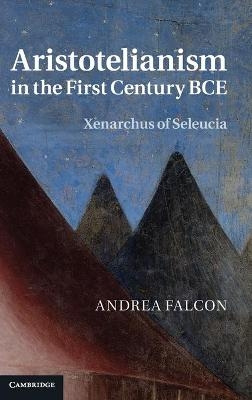
Aristotelianism in the First Century BCE
Xenarchus of Seleucia
Seiten
2011
Cambridge University Press (Verlag)
978-0-521-87650-6 (ISBN)
Cambridge University Press (Verlag)
978-0-521-87650-6 (ISBN)
This book examines the reception of Aristotle in antiquity through a full study of the surviving evidence for Xenarchus of Seleucia, an early interpreter. It argues that the novelty and audacity of Aristotle's philosophy are fully revealed by investigating its often mixed reception in the early stages of the Peripatetic tradition.
This book is a full study of the remaining evidence for Xenarchus of Seleucia, one of the earliest interpreters of Aristotle. Andrea Falcon places the evidence in its context, the revival of interest in Aristotle's philosophy that took place in the first century BCE. Xenarchus is often presented as a rebel, challenging Aristotle and the Aristotelian tradition. Falcon argues that there is more to Xenarchus and his philosophical activity than an opposition to Aristotle; he was a creative philosopher, and his views are best understood as an attempt to revise and update Aristotle's philosophy. By looking at how Xenarchus negotiated different aspects of Aristotle's philosophy, this book highlights elements of rupture as well as strands of continuity within the Aristotelian tradition.
This book is a full study of the remaining evidence for Xenarchus of Seleucia, one of the earliest interpreters of Aristotle. Andrea Falcon places the evidence in its context, the revival of interest in Aristotle's philosophy that took place in the first century BCE. Xenarchus is often presented as a rebel, challenging Aristotle and the Aristotelian tradition. Falcon argues that there is more to Xenarchus and his philosophical activity than an opposition to Aristotle; he was a creative philosopher, and his views are best understood as an attempt to revise and update Aristotle's philosophy. By looking at how Xenarchus negotiated different aspects of Aristotle's philosophy, this book highlights elements of rupture as well as strands of continuity within the Aristotelian tradition.
Andrea Falcon is Associate Professor of Philosophy at Concordia University, Montréal. He is the author of Aristotle and the Science of Nature: Unity without Uniformity (Cambridge, 2005) and Corpi e Movimenti: Il De Caelo di Aristotele e la sua Traditione nel Mondo Antico (2001).
Introduction; 1. Xenarchus: the man, his work, and his influence in antiquity; 2. Texts, translations, and notes; Conclusion; Appendix. Vestiges of Xenarchus in the Middle Ages.
| Erscheint lt. Verlag | 15.12.2011 |
|---|---|
| Verlagsort | Cambridge |
| Sprache | englisch |
| Maße | 159 x 235 mm |
| Gewicht | 520 g |
| Themenwelt | Geschichte ► Allgemeine Geschichte ► Vor- und Frühgeschichte |
| Geisteswissenschaften ► Philosophie ► Philosophie Altertum / Antike | |
| Naturwissenschaften | |
| ISBN-10 | 0-521-87650-8 / 0521876508 |
| ISBN-13 | 978-0-521-87650-6 / 9780521876506 |
| Zustand | Neuware |
| Haben Sie eine Frage zum Produkt? |
Mehr entdecken
aus dem Bereich
aus dem Bereich
auf den Spuren der frühen Zivilisationen
Buch | Hardcover (2023)
C.H.Beck (Verlag)
CHF 27,95
Was Pompeji über uns erzählt
Buch | Hardcover (2023)
Propyläen (Verlag)
CHF 44,75


